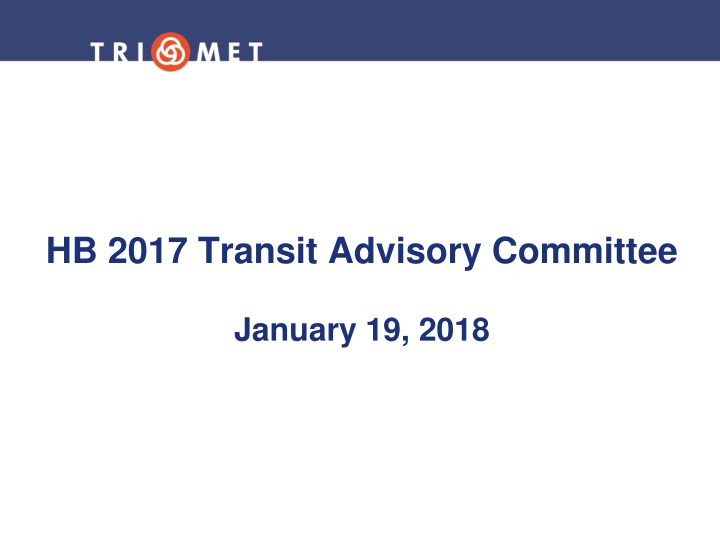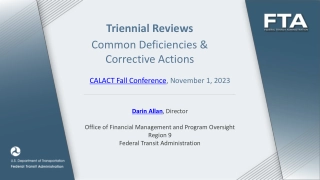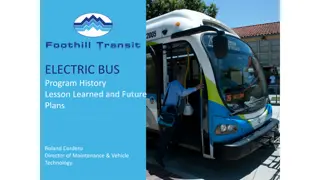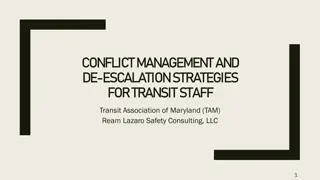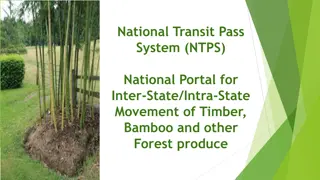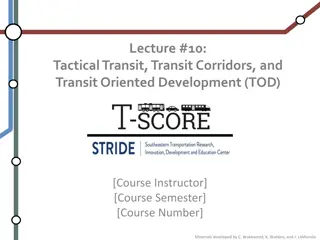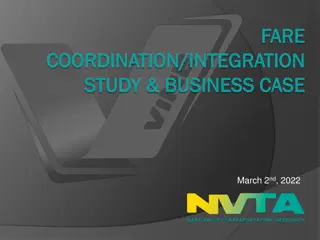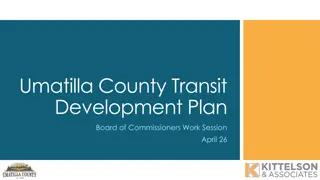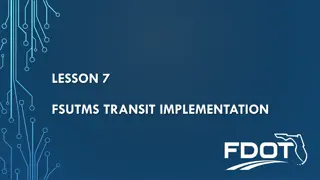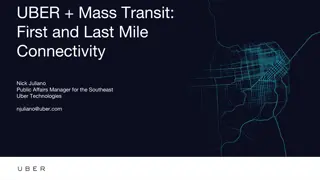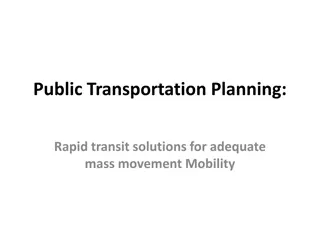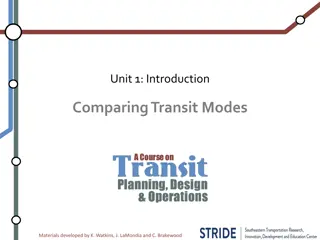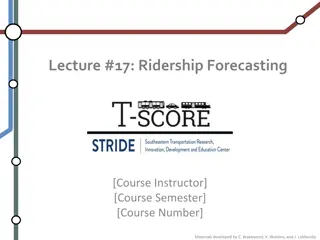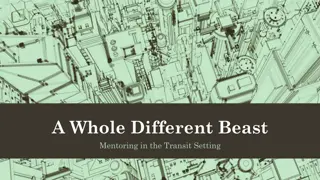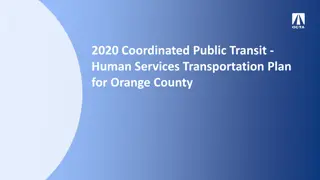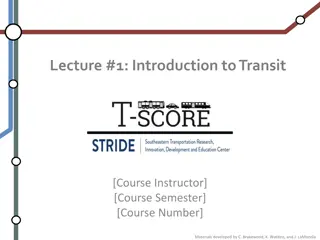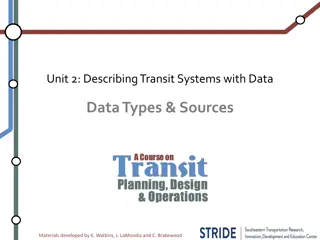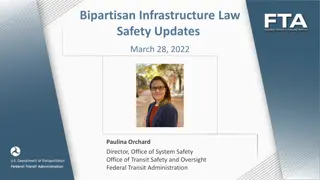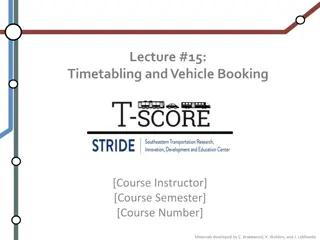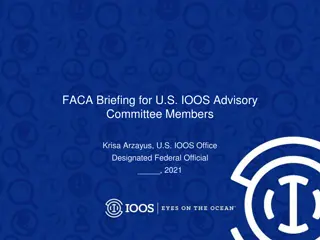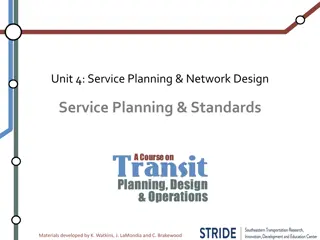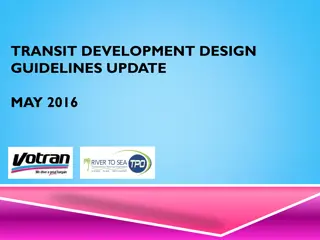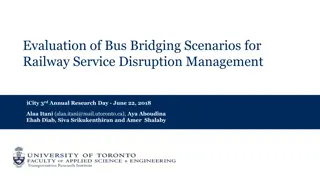HB 2017 Transit Advisory Committee
The HB 2017 Transit Advisory Committee meeting held on January 19, 2018, covered a range of topics including budget discussions, low-income fare proposals, regional coordination, and guiding statements for the Public Transportation Improvement Plan. The meeting agenda included action items from the previous meeting and questions from December 12th. The Advisory Committee discussed the specifics of the Public Transportation Improvement Plan, highlighting the focus on expanding and improving transit services for communities with a high percentage of low-income households, along with considerations for responsible contracting and workforce utilization.
Download Presentation

Please find below an Image/Link to download the presentation.
The content on the website is provided AS IS for your information and personal use only. It may not be sold, licensed, or shared on other websites without obtaining consent from the author.If you encounter any issues during the download, it is possible that the publisher has removed the file from their server.
You are allowed to download the files provided on this website for personal or commercial use, subject to the condition that they are used lawfully. All files are the property of their respective owners.
The content on the website is provided AS IS for your information and personal use only. It may not be sold, licensed, or shared on other websites without obtaining consent from the author.
E N D
Presentation Transcript
HB 2017 Transit Advisory Committee January 19, 2018
Meeting Agenda Welcome and Introductions Action Items from Last Meeting Questions from Dec. 12thmeeting Review & Approve Revised Guiding Statement Review & Approve Low Income Fare FY19 Service Proposal Regional Coordination Public Comment
Questions from Dec. 12th Budget: where does electric bus purchases fall in TriMet s overall bus purchasing program? To be discussed when we talk about the capital program (Feb. 23rd) Commute Trip Patterns Consultant making maps showing the commute trip patterns for communities outside the TriMet district TriMet has maps showing the commute trip patterns for communities inside the TriMet district Maps will be available for Regional Coordination Technical Committee on Jan. 26thand for the Advisory Committee when we begin to discuss service improvements.
Advisory Committee Guiding Statement The Public Transportation Improvement Plan will guide TriMet on how to spend State Transportation Improvement Funds (STIF) for the following purposes: expansion of existing and creation of new transit services (including last mile services), except for light rail, with consideration for communities with a high percentage of low-income households and responsible contracting and workforce utilization, programs to reduce transit fares for communities with a high percentage of low-income households, procurement of buses powered by natural gas or electricity, capital projects required for the creation, expansion and improvement of transit services, including projects intended to improve speed and reliability, with consideration for communities with a high percentage of low-income households and responsible contracting and workforce utilization, expansion of existing/creation of new transit services in communities outside the TriMet service district, but inside in Clackamas, Multnomah, and Washington counties, and regional coordination/reduction of fragmentation between TriMet and communities outside the TriMet service district, but inside Clackamas, Multnomah, and Washington counties.
Low Income Fare HB 2017: programs to reduce fares for public transportation for communities with a high percentage of low-income households Low Income Fare Taskforce Recommendations: Recommended eligibility of up to 200% FPL Recommended a program subsidy at 50% off of an Adult day pass and 70% off of an Adult monthly pass (equivalent to Honored Citizen and Youth Fare structures) Approximately $12.3 million per year; supporting up to 45,000 riders TriMet s commitment that any new resources would be prioritized to fund the new LIF Program and service increases Funds will not be received until early 2019; however, TriMet s goal is to launch in July 2018
FY19 Service Proposal Why talk about this now? Where did it come from? Guidelines Balancing objectives
FY19 Service Proposal Timeline July 2018, HB2017 tax effective September 2017-January 2018 Initial Proposal outreach January 2018-February 2018 Second round of outreach March 2018 TriMet Board of Directors first reading April 2018 TriMet Board of Directors, adoption May-August 2018 Operational readiness September 2018 Service begins
Existing Requests Frequent Service more frequent New Frequent Service bus lines Route changes or extensions New bus lines Employment access
Balancing Objectives Safety & Equity Service Hours Ridership based Geographic Coverage Capital Span of Service Lifeline coverage Schedule Reliability Frequency
Service Planning Demand Growth Productivity Connections Operations Bus Equity Availability Service Plan
FY19 Service Proposal 24 hour service on lines 20-Burnside/Stark and 57- TV Hwy. New bus service to the Portland Airport when Red Line isn t running Increased frequency on 3 bus lines (20,73- 122nd,81-Kane Rd/257th) Route change to 2 bus lines (24-Fremont,79- Clackamas/Oregon City) Increased span of service (61-Marquam Hill/Beaverton,64-Marquam Hill/Tigard,66-Marquam Hill/Hollywood,68-Marquam Hill/Collins Circle, 96- Tualatin/I-5) One new bus line (Clackamas County on Webster Road)
Regional Coordination Regional coordination and reduction of fragmentation between TriMet and communities outside the TriMet service district, but inside Clackamas, Multnomah, and Washington counties. Last mile service to difficult to serve areas due to: Street network Low density areas
Regional Coordination Reducing Fragmentation Rural Shuttle Last Mile Shuttle TriMet Network Outside TriMet District Inside/Outside TriMet Connection: Reduce Fragmentation Inside TriMet District
Regional Coordination Existing last mile shuttles: GroveLink Forest Grove N. Hillsboro Shuttle N. Hillsboro Industrial Area Tualatin Shuttle Tualatin Industrial Area PCC late night shuttle to Swan Island
Regional Coordination Set aside funding for shuttles to: Serve difficult to serve areas Connect with out of district communities $2.0 mil Review at the end of the process
Topics for Next Meeting Dependencies for new service (mechanics, buses, garages, etc.) Maximum ramp up of new service Other investments: Electric Bus Articulated Bus System Capital Enhanced Transit
